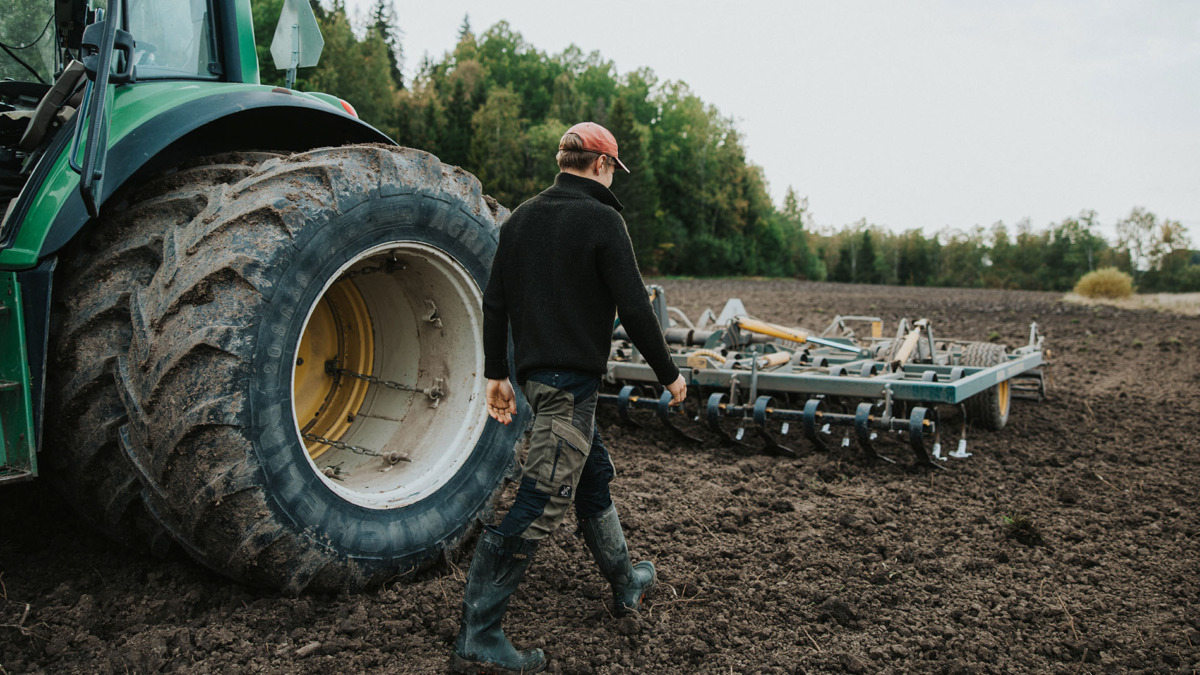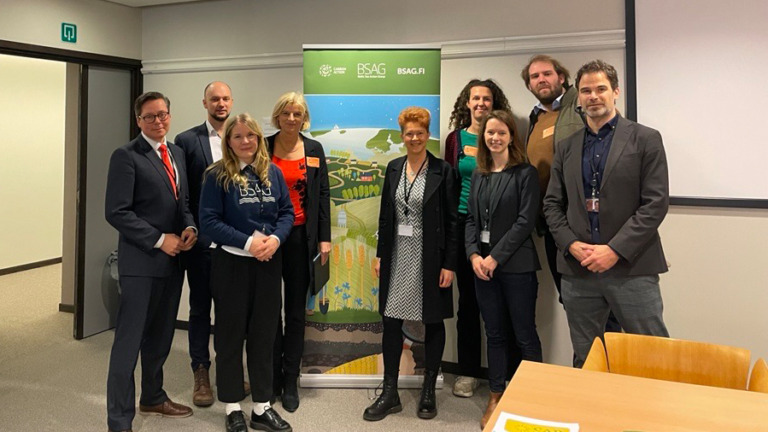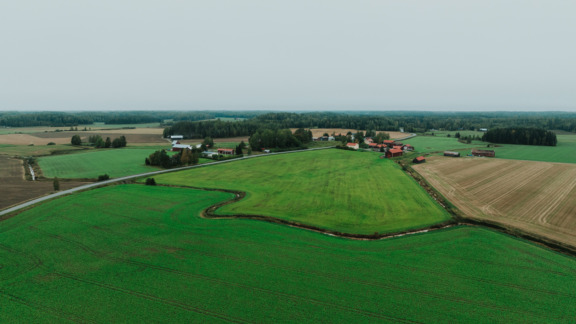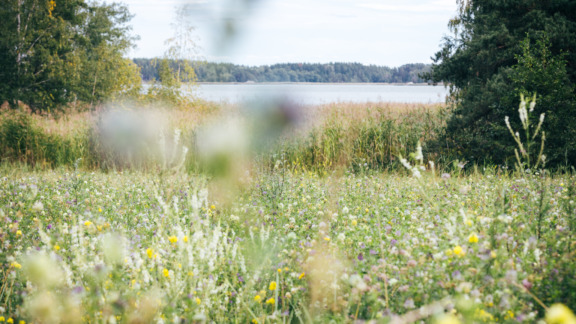Agriculture can mitigate many current and future threats
Improving the long-term viability and sustainability of agriculture can help societies tackle current and future challenges, including climate change, biodiversity loss, rural livelihood and security threats. This is the message of a new initiative fostering dialogue on the role and measures in the EU Common Agriculture Policy and its upcoming reform.

Agriculture is very much a strategic sector. This has been recognized in the conclusions of the Strategic Dialogue as well as in statements by the Commissioner for Agriculture and Food, Christophe Hansen. Agriculture has the potential to supply societies with nutritious food, as well as solutions to cope with and mitigate climate change, reverse biodiversity decline, and strengthen resilience and security in times of geopolitical tension.
The CAP Initiative launched by the Baltic Sea Action Group (BSAG) with partners calls all stakeholders to join in a dialogue that explores agricultural policies that steer towards a future where profitable agriculture, in addition to producing high-quality food, contributes with climate and nature benefits and strengthens the resilience and security of our societies. The Initiative enriches the discussion about agriculture and food policy, builds bridges, and identifies new values added for agriculture policy as we move into the 2030s. In particular, the Initiative aims to raise relevant questions and propose solutions to be considered in the formulation of the Common Agricultural Policy for 2028–2034.
An event marking the EU launch of the dialogue, held in the European Parliament on 11 December, highlighted the urgency of recognizing the importance of agriculture for the future well-being of European people and ecosystems. In their opening messages, the co-hosts, MEPs Elsi Katainen (RENEW) and Pekka Toveri (EPP) underscored the boundary conditions and strategic considerations with agriculture policy and the EU food system. In the reality of growing demands and pressures on public budgets, the allocation for agriculture and CAP must be used more effectively while also tying market funding to sustainability objectives. To strengthen EU security and strategic autonomy, future policy should help decouple food production from input dependencies that are making Europe vulnerable to autocratic governments.
Navigating the complex context of agriculture policy
The CAP Initiative focuses on the EU CAP, as it is the main joint policy and funding instrument for agriculture, and its future objectives and elements are currently being shaped. However, the practices and measures applied by farmers and farm managers are key to meeting system level and strategic objectives. In addition to the CAP, these are increasingly steered by a complex mix of market factors, trade policies, and cultural and personal factors.
Dr. Sjoukje Heimovaara, President of the Executive Committee of Wageningen University and Research, elaborated on this complexity of the priority issues of the EU food system in her keynote. She introduced the key interconnected dilemmas for future land use, based on a recent report. Where should we aim at in terms of self-sufficiency for food and agricultural inputs? How to secure sufficient land area for both food, fibre and biomass production, as well as for biodiversity and provision of ecosystem services? What should be the role of animals? And what is the right balance of EU, national and market intervention with regards to climate and biodiversity objectives, or consumer behavior?
The need to decouple food production and fossil-based energy and other inputs increases the demand for more biobased energy and materials. This translates to pressures on land use and increasing demand for fertile land. Europe is already witnessing climate change driven impacts on agricultural lands and soil, so the question is to find and scale the fertility and availability of land to meet all needs.
There are “no pain-free solutions”, as Dr. Heimovaara puts it, but there is a multitude of potential solutions, and we still have degrees of freedom to maneuver between the different alternatives. The key is to understand the interconnectedness of the dilemmas – and the choices to address them – underscoring the value of a broad systemic approach and discussion amongst the food system actors and stakeholders.
“In this complex reality, dialogue and striving for better mutual understanding are essential for finding sustainable solutions. We need new thinking and a very broad understanding to build policies that work. This is what the CAP Initiative offers,” says Ville Wahlberg, Managing Director of the Baltic Sea Action Group.

Profitable farms and motivated farmers prerequisite for sustainability transition
Farming, which delivers food, well-being for the farming communities, and various intangible goods and amenities for societies requires human labour, knowledge, and skills. As climate change produces new farming conditions, farmers require new skills.
Speaking at the event in the European Parliament on 11 December, farmers from around Europe, representing sectors from fruits and vegetables and grain crops to cattle farming, introduced the benefits of e.g. improving soil health, but also reminded that they expect fair prices along with support for knowledge and transitional investments to sustain farming. In the long term, farmers call for predictability in overall policy and objectives, flexibility at regional and farm level, and access to land and finance to support generational renewal and entry of young farmers into the sector.
Poor profitability in agriculture hampers the sector’s transition to sustainability and discourages young people from entering the sector. Rūdolfs Pulkstenis, Vice-President of the European Council of Young Farmers CEJA, underscored the importance of economic opportunities and risk management: young farmers must have access to land and finance for the necessary investments on reasonable terms.
Dialogue can uncover new solutions
The CAP Initiative is based on the evidence and understanding that better and scalable solutions are available. There is a growing amount of research evidence in Europe on how to optimize soil fertility and field cultivation under different conditions, what measures can increase productivity, biodiversity and carbon sequestration at the same time, or how to measure and incentivize these practices. Agri-food companies have also increased their attention to supply chain security and sustainability.
Through dialogue, stakeholders can identify policy solutions which best tap into the potential and capacities of the industry to boost transformation of farming and agriculture in the desired direction.
The partners of the Initiative believe focus should be placed precisely on systemic transformation and transitional support. The Initiative will run through 2025 and will be increasingly communicated at the Member State levels while maintaining EU-wide visibility, observing the follow-up processes to the Strategic Dialogue and the publication of the Vision for Agriculture and Food.
“There is no shortage of difficult choices in agricultural policymaking, but we must recognize the extremely high price of inaction and preserving the status quo. The decisions to be made in the next few years will have implications for the decades to come”, says Wahlberg.
CONTACT US

Kaj Granholm
Project Manager, Regenerative Agriculture, EU affairs




